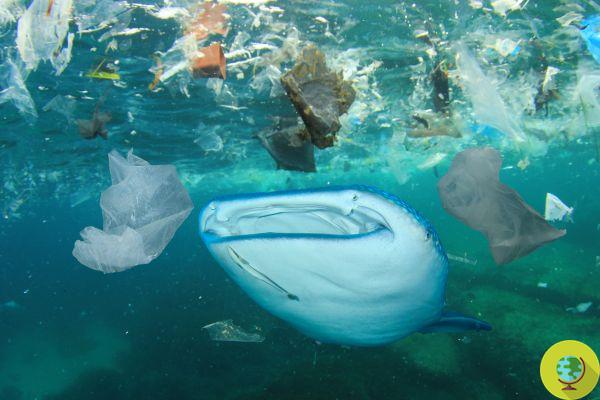
There are trillions of microplastics in the ocean, and 67% of sharks have fragments in their stomachs. The new Scientific Reports study
There are trillions of microplastics in the ocean, and 67% of sharks have fragments in their stomachs. A new study published by Scientific Reports looked at ingestion in four species of demersal sharks, which live in the North Atlantic Ocean. And the results are truly alarming.
Seas more and more suffocated by plastic and the marine fauna is paying the consequences. A team of six researchers from the University of Exeter and the University of Leeds examined the stomach and digestive tract of 46 sharks and found that 67% contained microplastics. A total of 379 plastic particles or fibers smaller than 5 millimeters were found.
Many of the plastic fibers were synthetic cellulose, the material found in polyester clothing and hygiene products such as face masks.
"I think this is a cause for concern," Kristian Parton, lead author of the study and a researcher at the University of Exeter's Center for Ecology and Conservation, told Mongabay. "Although many of the particles ingested by these sharks will eventually be excreted, they potentially remain inside the body long enough to allow inorganic pollutants and chemicals to enter the bodies of these sharks."
Microplastics are now truly everywhere: new studies reveal the terrible contamination
According to the researcher, the findings are alarming for sharks living off the coast of Penzance in Cornwall on the southwestern tip of Britain.
“I didn't actually expect to find all these microplastics, I didn't think there was this pollution,” he continued. The co-author of the study Tamara Galloway also shares the same idea. "Our study highlights how important it is to think before throwing things away".
Demersal sharks can be found at depths of 5 to 900 meters. The four demersal shark species considered are Scyliorhinus canicula, Mustelus asterias, Squalus acanthias, and Scyliorhinus stellaris.
"There appear to be two pathways that allow these particles to end up in the shark's body: food or crustaceans or direct ingestion," Parton continued.
Some sharks had only a few particles of plastic, but others by the dozen. The larger the shark, the more plastic it contained. The largest number of microplastics was found in a single shark, which had 154 polypropylene fibers within its stomach and intestines.
"It is perhaps probable that this single shark swallowed a large piece of fishing net and it broke during the digestive process." At present, microplastics are known to negatively affect the feeding behavior, development, reproduction and lifespan of zooplankton and crustaceans, with little on what they entail on sharks.
"If we can show that these fibers contain inorganic pollutants attached to them, then this could have real consequences for these shark species at the cellular level, affecting various internal systems," Parton said.
This new study demonstrates once again how pervasive and destructive plastic pollution in the marine environment can be.
"Our addiction to plastics combined with the lack of mechanisms to protect our oceans is suffocating marine life," explained Will McCallum of Greenpeace UK. “Sharks sit at the top of the marine food chain and play a vital role in ocean ecosystems. However, they are fully exposed to pollutants and other human impact activities. We need to stop making so much plastic. The ocean is not our landfill, marine life deserves better than plastic ”.
Font: Nature/Mongabay
Read also:
- Microplastics in fish and animals of the Tyrrhenian Sea: Greenpeace's shocking discovery
- Fizzy drinks and soft drinks, they're all chock full of microplastics. Here is who contains the most


























